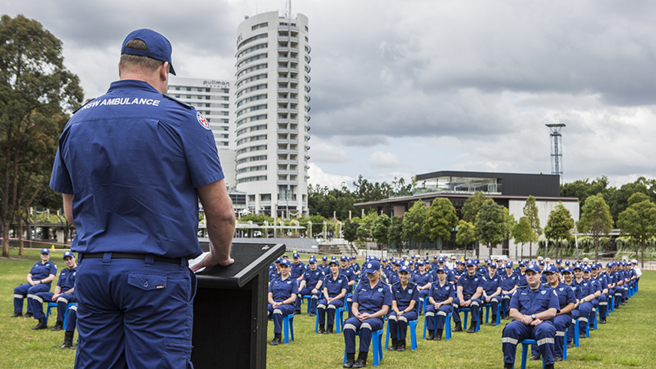
The first Paramedic Trainees under the new Post Employment Tertiary Pathway (PETP) have been formally welcomed to NSW Ambulance.
For many the pathway is a chance to fulfill a lifelong dream whatever their circumstances or stage of life.
The feeling of nervous energy rippled through the blue queue on Showground Road, Olympic Park.
“I’m going to cry for sure,” said Paramedic Trainee Anysia McDavitt, a former aged care worker from Wollongong, as she lined up before the Paramedic Shield Presentation.
NSW Ambulance educators beamed and hovered over their trainees as they marched on to Cathy Freeman Park on Friday 4 November in the shadow of Sydney’s Olympic Stadium.
The event was a Paramedic Shield Presentation like any other, full of hope, promise and celebration of personal milestones.
It was also a significant organisational milestone for NSW Ambulance – with the first cohort of PETP trainees making up 129 of the 153 students who celebrated their induction before hitting the road.
The PETP was established this year in collaboration with NSW universities, and allows applicants with no prior health experience to be in paid employment with NSW Ambulance while completing an approved degree in paramedicine.
During their employment and while studying they are referred to as Paramedic Trainees.
For Anysia and her Paramedic Trainee colleagues, the new pathway has meant a start in a career they’d always dreamed of.
“All I ever wanted since I was 15 was to be a paramedic,” Anysia said. “I was trying to start paramedicine at uni when I was 21, when my mother passed away.”
Anysia spent the next eight years caring for her younger sister. Now aged 30, her dream of becoming a NSW Ambulance paramedic has finally come true – thanks to the PETP.
“Many people in the class would not be here if not for this pathway, myself included,” Anysia said.
“I know the biggest moment of my life is going to be when I drive out of the station for the first time.”
Albert Santos left his young family behind in Longreach to follow his dream of becoming a paramedic.
“The opportunity to be able to work, study, get paid and grow as a paramedic from the get-go is the utmost.
“I had actually made a decision to study paramedicine up in Queensland. Then in July the NSW Government announced this pathway – it was like the stars lining up.
“The hardest part is my family. Hopefully after 12 months I can get a permanent posting and my family will come down and join me. In the meanwhile I’ve met 160-odd brothers and sisters in this course.”

For Jacob Patterson, of Campbelltown, being a Paramedic Trainee will mean spending more time with family.
Jacob is joining his older brother Andrew Patterson, a Paramedic Educator in South West Sydney Sector.
“I was working another job at Bankstown Airport building aircraft parts, but had always wanted to join NSW Ambulance. I didn’t know which way to go in – either university or VET (Vocational Education and Training). But this job popped up and I got in,” Jacob said.
“I got the call on Saturday and I started the course three days later.”
Andrew was full of praise for his younger brother.
“I’m incredibly proud of him – he’s exceeded even my expectations,” he said.
“It’s a difficult pathway to go through especially in the first couple of months. I’ll be keeping a watch out.”
It was a case of “If not now, when?” for Paramedic Trainee Niss Small, of Berowra, who has just started at Wahroonga Station.
“Being someone with a family I needed a paid pathway. So this was a perfect opportunity to finally do something new,” Niss said.
“I used to work in medical administration. I didn’t want to work in allied health, which would have required a degree.
“It was something I thought about 10 years ago, but my kids were too little. They’re now 19 and 16, so it’s my turn now!”
Lead coordinator of the PETP program Kirsty England paid a glowing tribute to the trainees and their educators.
“I’m just so proud of everything that they’ve achieved. They’ve sacrificed so much to be here.
"For many of them it’s a lifelong dream and they’ve worked so incredibly hard.”
